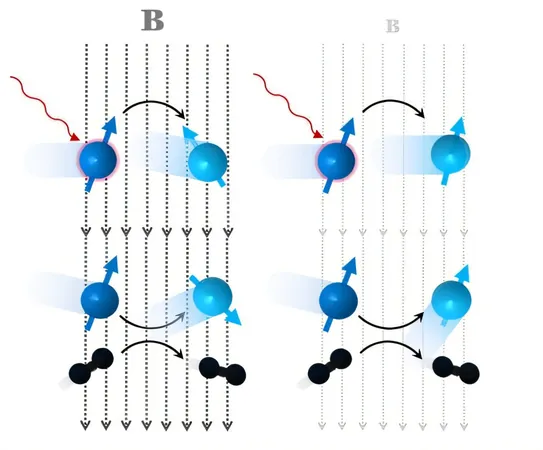
Breakthrough Discovery: Scientists Unlock Secrets to Longer-lasting Quantum Spins
2025-04-10
Author: Wei Ling
Revolutionizing Quantum Technology
In a groundbreaking new study, scientists have uncovered a method that could transform the realm of quantum computing and sensing. Researchers have found that the delicate electron spins—tiny magnetic properties that hold vital information—can be safeguarded from losing their quantum state for significantly longer durations, simply by applying low magnetic fields.
Defying the Norms of Decoherence
Traditionally, these spins lose coherence rapidly when interacting with surrounding particles or absorbing light, limiting their application in advanced technologies like quantum sensors and atomic clocks. However, this new research highlights that even interactions known to disrupt these spins can be effectively suppressed using weak magnetic fields.
A Leap Forward in Quantum Control
Conducted by researchers from the Hebrew University of Jerusalem and Cornell University, this study showcases a robust method for minimizing spin decoherence, especially in alkali-metal gases. The findings, detailed in the prestigious Physical Review Letters, reveal an astonishing order-of-magnitude reduction in spin relaxation rates under low magnetic fields—an advancement that could pave the way for cutting-edge quantum devices.
Leading the Charge
The study was spearheaded by Mark Dikopoltsev and Avraham Berrebi, under the guidance of esteemed professors from the Hebrew University and Cornell University. Their focus was on hot cesium spins, which are particularly susceptible to decoherence due to spin-rotation interactions with nitrogen molecules and absorption of near-resonant light.
Breaking Barriers in Decoherence
The team astonishingly demonstrated that these disruptive decoherence effects could be dramatically reduced by simply applying low magnetic fields, surpassing previously established regimes like spin-exchange relaxation-free (SERF). This means that magnetic fields aren't just passive tools for conserving spin; they can also actively control the mechanisms that lead to decoherence.
A Game-Changer for Quantum Preservation
As Dikopoltsev noted, "Our results show that low magnetic fields are not just useful for avoiding decoherence from random, spin-conserving interactions. They can actively suppress more damaging relaxation processes, giving us a powerful tool for preserving spin coherence." This revelation not only enhances our comprehension of quantum systems but also opens up a world of possibilities for the future of quantum technology.

 Brasil (PT)
Brasil (PT)
 Canada (EN)
Canada (EN)
 Chile (ES)
Chile (ES)
 Česko (CS)
Česko (CS)
 대한민국 (KO)
대한민국 (KO)
 España (ES)
España (ES)
 France (FR)
France (FR)
 Hong Kong (EN)
Hong Kong (EN)
 Italia (IT)
Italia (IT)
 日本 (JA)
日本 (JA)
 Magyarország (HU)
Magyarország (HU)
 Norge (NO)
Norge (NO)
 Polska (PL)
Polska (PL)
 Schweiz (DE)
Schweiz (DE)
 Singapore (EN)
Singapore (EN)
 Sverige (SV)
Sverige (SV)
 Suomi (FI)
Suomi (FI)
 Türkiye (TR)
Türkiye (TR)
 الإمارات العربية المتحدة (AR)
الإمارات العربية المتحدة (AR)